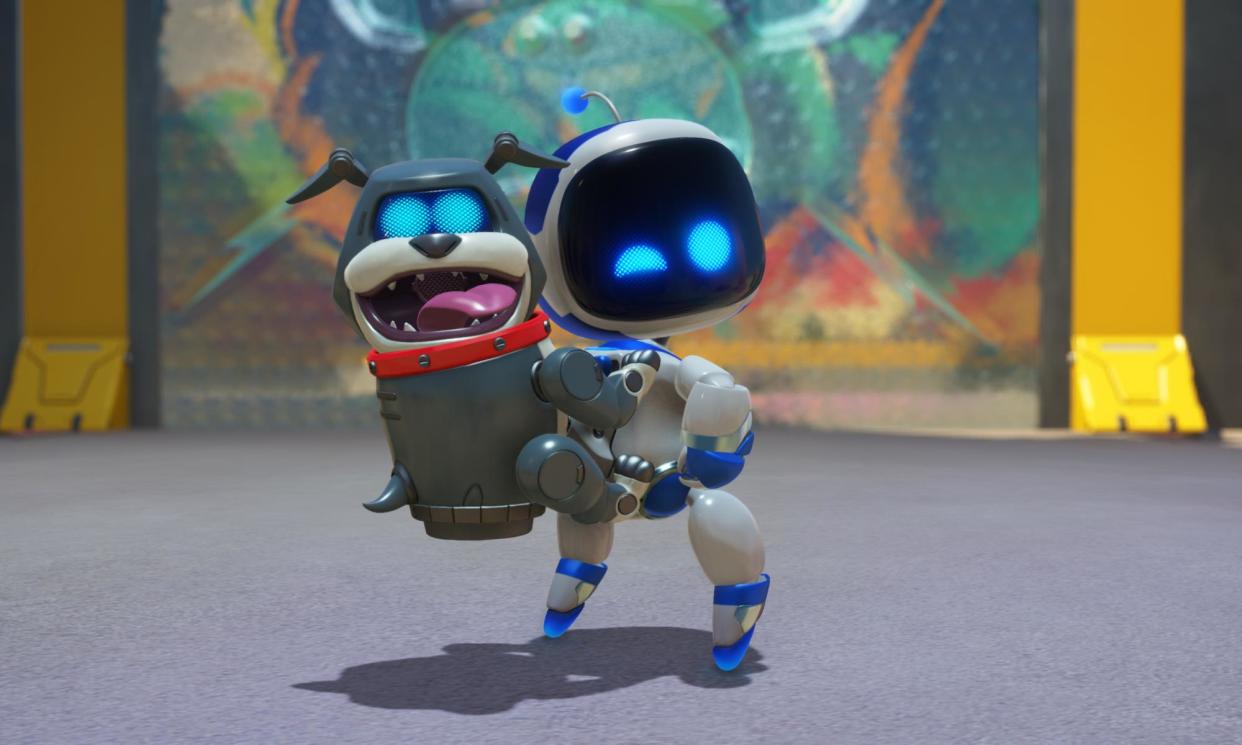Astro Bot review – glittering ideas make Team Asobi’s 3D platformer a gem

When I say that Astro Bot reminds me of Super Mario Galaxy, I could pay it no higher compliment. It’s not that it’s derivative: indeed it’s the very abundance of new ideas that places it up there with Nintendo’s best 3D platformers. It has taken me around its own small galaxy of planetoid-style levels, from bathhouses to diorama-sized jungle temples to rainy islands, each host to a brilliant one-shot idea, such as a pair of frog boxing gloves or a backpack monkey or a time-stopping watch that lets you freeze giant zooming darts in place so you can jump on them. It is splendid to witness this development team’s creativity let loose.
Team Asobi has previously made a couple of short-form Astro Bot games – one for the PSVR, Rescue Mission, and another that came packaged with the PS5 at launch, Astro’s Playroom – but this one is full-length, complete with challenging bonus levels that play out like electrified skill-check gauntlets for the generation raised on 3D platformers. It is supremely funny and characterful, thanks to the titular chibi blue-and-white robot and his crowd of friends, many of whom are dressed up as characters from the most obscure crevices of PlayStation history. The attention paid to these bots – their animation, their mannerisms, their dance moves and little cries for help when they’re stuck up a tree being menaced by malevolent octopuses – fills them to the brim with personality.
In Astro’s Playroom, the conceit was that it was set inside the PlayStation 5 itself – you played levels based on the zooming speed of the SSD and its singing graphics processing unit – and the scenery’s visual design was technologically flavoured, with trees made of tangled wires and computer-chip-style patterns of lines and switches decorating every smooth surface. Astro Bot has a similar aesthetic, but isn’t limited by it.
This time, the PS5 is the bots’ mothership, and you have crash-landed on a desert planet, scattering hundreds of bots across the surrounding galaxy. As the last remaining bot, you zoom into each level on a PS5-controller-shaped rescue ship, reassembling your comrades and rebuilding your craft back home.
At the end of each cluster of planets lurks a boss straight out of a slapstick cartoon (or indeed a 90s platformer), guarding a piece of the ship that you then clean up and reassemble with giant robot arms, carefully pulling the triggers and tilting the controller around to polish off grime, saw off chunks of ice or align components. It is wonderfully fun and tactile, and indeed the whole game revolves around the PS5 controller’s unique and sometimes bizarre capabilities. An inventive use is found for everything, from the tiny microphone to the touchpad in the controller’s centre, as Astro Bot feels along walls for weaknesses and clings haplessly to the rescue ship as you guide it through space by tilting it around like a steering wheel.
The developer’s evident mastery of the PlayStation 5 is impressive here. Even when there’s a hundred bots on screen making a bridge for you to cross, or when the scenery explodes into a thousand tiny fragments that ping around the place, or when you fly down a waterslide accompanied by a bunch of inflatable balls … everything is smooth and snappy. You can slice logs apart with Astro’s jetpack and then test whether they float (they do), which is pointless but such fun. When you fly through clouds of PlayStation-symbol-shaped space dust, you can feel the impact of each as a tiny rumble on the correct part of the controller. Astro’s punch, jump and hover manoeuvres are absolutely pixel-perfect. This level of detail makes a difference in a game. It’s the kind of lavish care that most developers simply cannot afford, and as such it feels like a special treat for the player, the equivalent of five-star service.
I also really appreciated how great Astro Bot was to play with my kids. There’s no two-player co-op, but instead the game works well as a pad-passer; my seven-year-old was mostly content to watch when I played, giggling at the jokes, and my five-year-old would amble about in the safer areas of the levels, handing me the pad whenever he hit a tricky part.
Several of Astro Bot’s planets have little hub areas that feel like enclosed playgrounds, with balls to kick and non-threatening baddies to whack, pools to jump into and small acrobatic challenges to tackle. My kids were both enthralled by the cuteness and vibrancy of it all, even as the references to Uncharted, God of War, Ape Escape and every other old PlayStation game you could think of soared over their heads.
Astro Bot is still the wonderful tribute to PlayStation history and hardware design that Astro’s Playroom was, but it has been given room to grow beyond a characterful tech demo and into the best platform game I have played in many years. Actually, it’s one of the best platformers I’ve ever played, – and, as a child of the 90s, I truly have played a tonne of them. PlayStation has been lacking a great homegrown family-friendly game since LittleBigPlanet, and Astro Bot is a worthy inheritor of that series’ playfully humorous legacy.
• Astro Bot is out on 6 September; £54.99


